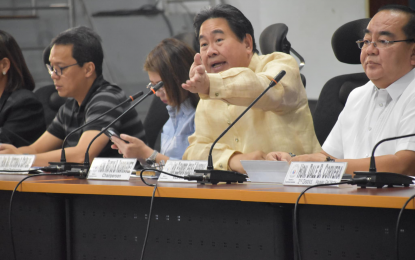
MANILA – The House Committee on Constitutional Amendments will continue holding public hearings and consultations on measures seeking to amend the 1987 Constitution, its chairman said on Monday.
Cagayan de Oro City Representative Rufus Rodriguez made the statement even after President Ferdinand R. Marcos Jr.'s remark that amending the Charter is not one of the priorities of his administration.
“We respect the opinion of President Ferdinand Marcos Jr. on constitutional amendment measures. We will of course consider it. But as an independent branch of government, the House of Representatives and Congress will proceed with its public dialogues on this issue,” he said.
Based on the previous hearings conducted by his panel, Rodriguez said there was an "overwhelming recommendation" to rewrite the Constitution’s economic provisions to allow for more foreign investments.
“We laud and commend President Marcos Jr. for trying to entice foreign businessmen in his trips abroad to invest their money in the country. He is our best salesman. But certain restrictive provisions of the Charter could be impeding investments,” he said.
Rodriguez noted that participants also suggested the calling of an elected constitutional convention to propose Charter changes.
“The emerging consensus is to relax restrictions on the entry of foreign capital into the country,” he said.
He said that his committee will hold more consultations in other parts of Luzon.
In a media interview on a plane en route to Manila on Sunday following his five-day official trip to Japan, Marcos said there are other ways to attract more foreign investments without having to amend the Constitution.
“The reason that it’s being talked about is because of the economic provisions. Gusto nga natin magkaroon ng investment kung minsan sagabal. Alam naman ninyo ‘yung mga issue diyan (We want to have more investments and sometimes there are hurdles. You know the issues there),” he said.
“But for me, lahat itong mga pinag-usapan kaya nating gawin na hindi palitan ang Saligang Batas (all of these that are being talked about, we can do it without amending the Constitution),” he added.
During the observance of Philippine Constitution Day last Feb. 8, Marcos said the 1987 Constitution remains "dynamic" and "flexible," noting that it has undergone several amendments to keep up with the "changing times."
He said the charter also continues to protect and uphold the "fundamental rights and freedom of every Filipino.”
Speaker Martin Romualdez earlier said that opening the economy for the inflow of foreign capital is the key to addressing the aspirations and ideals of Filipinos in present times.
He highlighted the need for foreign direct investments (FDIs) by citing data and the experiences of other countries, culled from the reports of the Congressional Policy and Budget Research Department, which show how FDIs stimulate economic growth.
Based on the United Nations data, he said FDIs account for the largest source of external financing in developing countries, greater than remittances, private debt and portfolio equity, or official development assistance.
“Higher FDI inflows can ease capital constraints and contribute to output and employment growth. Given the appropriate host-country policies and a basic level of development, a preponderance of studies shows that FDI triggers technology spillovers, assists human capital formation, contributes to international trade integration, helps create a more competitive business environment and enhances enterprise development,” he said.
“All of these contribute to higher economic growth, which is the most potent tool for alleviating poverty in developing countries,” he added.
Romualdez lamented that the country has not been getting as much FDIs as its neighbors are receiving.
In 2020, he said the Philippines ranked third-most restrictive out of the 84 countries in the Organization for Economic Cooperation and Development’s (OECD) foreign direct investment regulatory restrictiveness index (FDI Index).
“Barriers to foreign direct investment (FDI) in the Philippines comprise of four main types of restrictions: foreign equity limitations; discriminatory screening or approval mechanisms; restrictions on the employment of foreigners as key personnel; and other operational restrictions, like restrictions on branching and capital repatriation or land ownership by foreign-owned enterprises,” he said.
He said investment restrictions on foreign ownership range from requiring at least 60 percent Filipino ownership to total prohibition.
He added that the Constitution prohibits foreign ownership in mass media and allows only 30 percent foreign capital in advertising agencies and 40 percent in educational facilities.
“In the education sector, foreign ownership caps prevented the Philippines from hosting topnotch universities seeking to establish a presence in Asia,” he emphasized.
He pointed out that while the country has been addressing foreign ownership limitations that has constrained investment in many sectors through legislation such as the Public Services Act, the Retail Trade Liberalization Act and the Foreign Investment Act, “fundamental investment restrictions enshrined in the Constitution could not be corrected by simple legislations nor by executive decisions.” (PNA)
